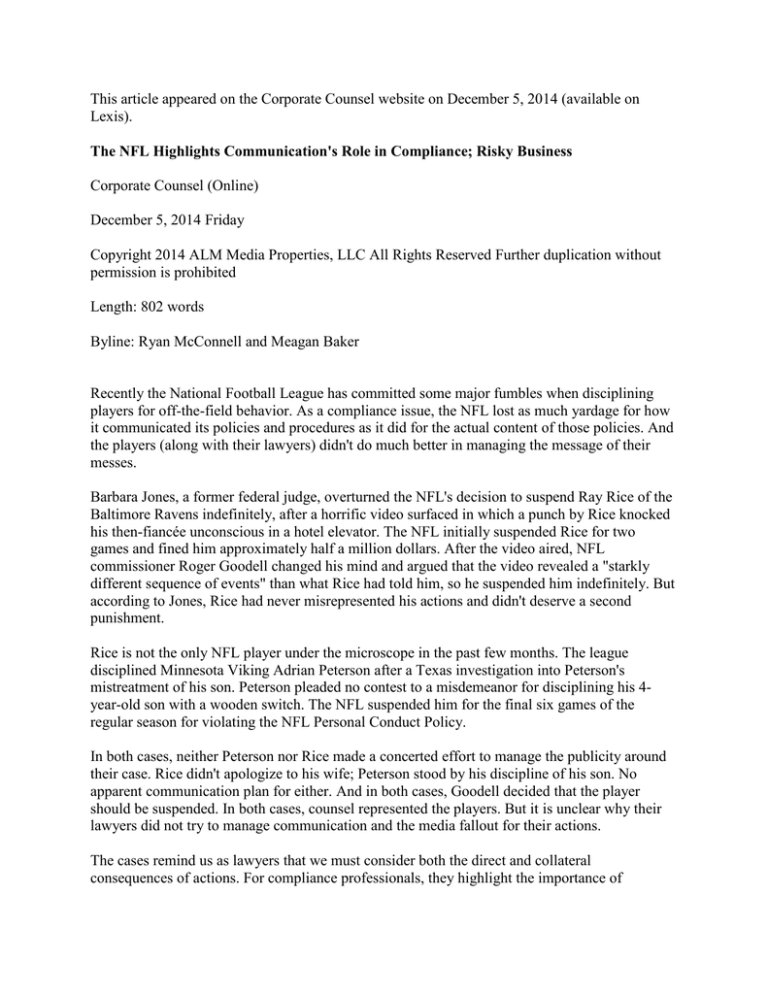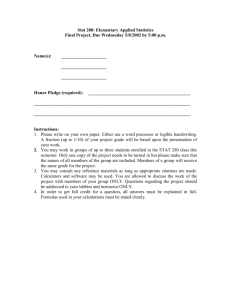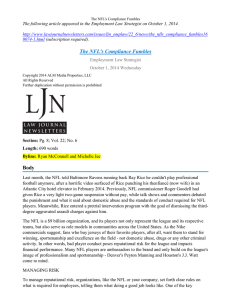
This article appeared on the Corporate Counsel website on December 5, 2014 (available on
Lexis).
The NFL Highlights Communication's Role in Compliance; Risky Business
Corporate Counsel (Online)
December 5, 2014 Friday
Copyright 2014 ALM Media Properties, LLC All Rights Reserved Further duplication without
permission is prohibited
Length: 802 words
Byline: Ryan McConnell and Meagan Baker
Recently the National Football League has committed some major fumbles when disciplining
players for off-the-field behavior. As a compliance issue, the NFL lost as much yardage for how
it communicated its policies and procedures as it did for the actual content of those policies. And
the players (along with their lawyers) didn't do much better in managing the message of their
messes.
Barbara Jones, a former federal judge, overturned the NFL's decision to suspend Ray Rice of the
Baltimore Ravens indefinitely, after a horrific video surfaced in which a punch by Rice knocked
his then-fiancée unconscious in a hotel elevator. The NFL initially suspended Rice for two
games and fined him approximately half a million dollars. After the video aired, NFL
commissioner Roger Goodell changed his mind and argued that the video revealed a "starkly
different sequence of events" than what Rice had told him, so he suspended him indefinitely. But
according to Jones, Rice had never misrepresented his actions and didn't deserve a second
punishment.
Rice is not the only NFL player under the microscope in the past few months. The league
disciplined Minnesota Viking Adrian Peterson after a Texas investigation into Peterson's
mistreatment of his son. Peterson pleaded no contest to a misdemeanor for disciplining his 4year-old son with a wooden switch. The NFL suspended him for the final six games of the
regular season for violating the NFL Personal Conduct Policy.
In both cases, neither Peterson nor Rice made a concerted effort to manage the publicity around
their case. Rice didn't apologize to his wife; Peterson stood by his discipline of his son. No
apparent communication plan for either. And in both cases, Goodell decided that the player
should be suspended. In both cases, counsel represented the players. But it is unclear why their
lawyers did not try to manage communication and the media fallout for their actions.
The cases remind us as lawyers that we must consider both the direct and collateral
consequences of actions. For compliance professionals, they highlight the importance of
communication-a key element of any corporate compliance program. Communication does not
mean simply communicating policies and controls to employees or discussing compliance efforts
across the organization. It also means managing external communications about the program,
which may include speaking about the organization's compliance efforts at conferences or
otherwise managing external communications about the program.
In the case of a compliance failure, the reputational damage often is worse than the regulatory
penalty. Getting ahead of a compliance failure with effective communication can help avoid
reputational damage. General Motors Corp. is facing lawsuits because of ignition-switch failures.
Notwithstanding the innovations such as the new Corvette Z06, how many people won't buy a
new GM car because they worry about whether their car will have an electrical issue? Or
consider last year's data breach involving Target Corp. Will shoppers looking for a holidayshopping deal think twice about Target because of the company's data breach? Anyone who has
ever dealt with identify theft knows that the problem can take days, weeks or months to fix.
Compliance failures can have reputational consequences that far outweigh regulatory penalties.
For any business, customer trust is a key ingredient to success. People go to banks because they
believe their money will be safe. They drive cars that they think are reliable. Consumers eat at
restaurants where they believe the food is safe. Peterson and Rice remind us that sometimes we
can win the battle but lose the war by not focusing on the big picture. Managing communication
efforts about an incident can help maintain customer trust.
Both Rice and Peterson faced modest regulatory consequences for their behavior (a no contest
plea for Peterson and a pre-trial intervention agreement for Rice), but neither will play
professional football this season. Players like Michael Vick show that the public can forgive a
damaged reputation, but as lawyers advising our clients (whether companies or individuals), we
must focus not only on the immediate regulatory consequences, but also on the collateral
reputational consequences.
Ryan McConnell and Meagan Baker are lawyers at McConnell Sovany -a boutique law firm in
Houston that focuses on corporate compliance consulting, criminal defense, and plaintiffs'
litigation. McConnell is a former federal prosecutor who teaches criminal procedure and
corporate compliance at the University of Houston Law Center. Baker is a South Texas College
of Law graduate whose practice focuses on the design and implementation of global compliance
programs. Please send suggestions for this column to rdm@mcconnellsovany.com



